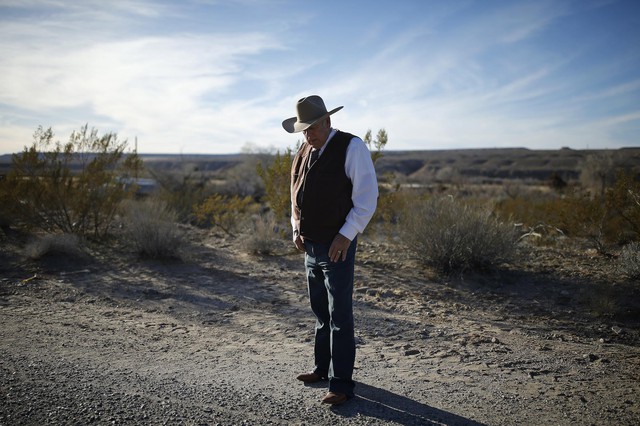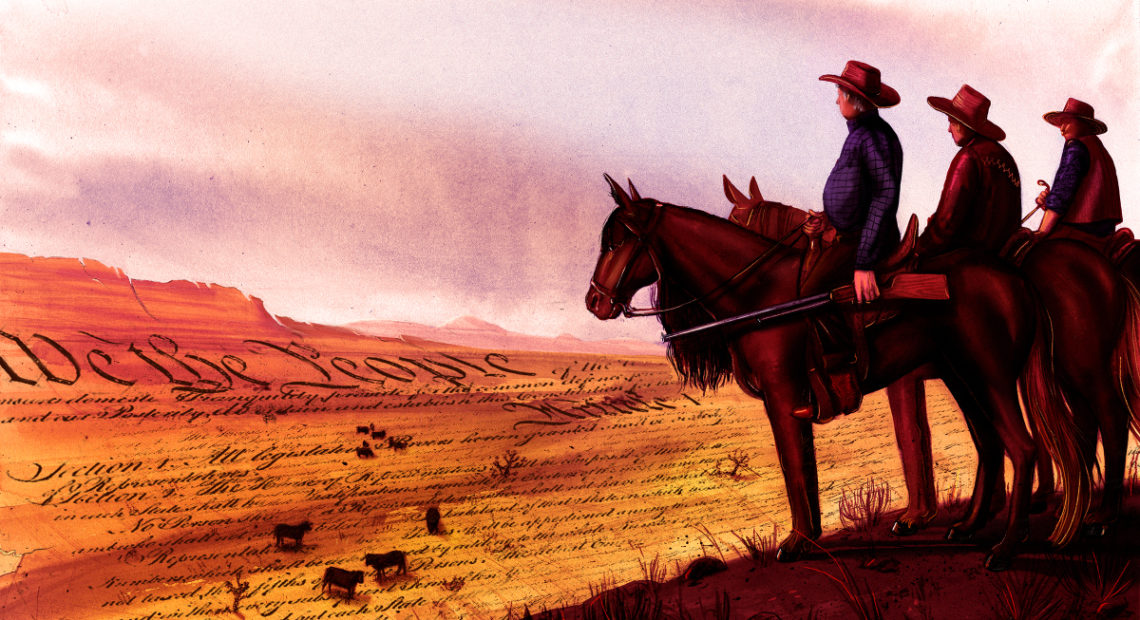
‘Bundyville’ Tells A Story Of Anti-Government Extremism Set In The Rural West, Says Podcast Host
Listen
BY SCOTT LEADINGHAM & ZACHARY GARNER
Early January 2019 will mark three years since the 2016 Malheur National Wildlife Refuge occupation in Oregon. A lot has happened since then.
The leaders, brothers Ammon and Ryan Bundy, were acquitted. A federal judge dismissed charges against them and their father, Cliven Bundy, in a separate case about cattle grazing fees and a standoff at the family’s Nevada ranch. And in July, President Donald Trump pardoned the Hammond ranching family whose federal case sparked the Oregon occupation.
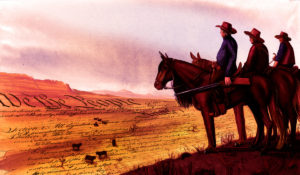
‘Bundyville’ is a seven-part podcast from Longreads and Oregon Public Boradcasting, hosted by Leah Sottile. CREDIT: Illustration by Zoë van Dijk for Longreads
Journalist Leah Sottile covered the occupation and its aftermath, and this year she released a deeply reported podcast about the Bundys – called Bundyville, a collaboration between Longreads and Oregon Public Broadcasting.
Sottile spoke with NWPB’s Scott Leadingham about the Bundy family and anti-government movement in the West.
(A tag to their conversation after this was recorded: Ammon Bundy recently said he was stepping away from social media, and said he disagreed with President Trump’s immigration rhetoric and treatment of migrants at the border. Leah Sottile talked with Ammon Bundy after that news.)
LINKS:
– Bundyville podcast from Longreads and Oregon Public Broadcasting
CONVERSATION HIGHLIGHTS (edited for length and clarity)
On how she got connected covering the Malheur occupation and why she went deeper:
The very first story that I did about the occupation was about artifacts being dug up there. I kept getting more and more interested and more and more confused by what was going on there. The Washington Post asked me to cover the court proceedings when the leadership of the occupation was arrested. The more I sat in court, the more questions I had, and the more things I thought weren’t being answered in court. One story turned into a bunch of stories. I just had to kind of keep digging.
On how the Bundy’s faith in the Church of Jesus Christ of Latter Day Saints (Mormon Church) influenced their actions:
It was always something I had in the back of mind that maybe it was a motivation but didn’t know for sure. When I was reporting on the trial in Nevada (from the 2014 ranch standoff), I fell into getting a copy of this book that the Bundys had put together that is a bunch of scripture that kind of reinforces an anti-government perspective. That’s certainly not what the LDS faith teaches, but the way the Bundys had kind of combed through scripture to affirm their belief system was what I found in this book.
That kind of opened up a can of worms. I asked them, how much does your faith have to do with this occupation and with the 2014 standoff, and Ryan Bundy told me, “Oh, it’s everything” – that’s the main cornerstone of all of it.
The Salt Lake City church has said that they in no way support the Bundy’s occupation, there’s no way scripture says you should stand off with the federal government. In fact, the Church is grounded in whatever country it’s set up in, because the Mormon Church is really spread across the globe, that you adhere to the flag of that government. So what the Bundys are doing is really taking it in a different direction than what the church wants.
On what is at the core of the Bundy’s cause:
One of the mistakes of helicopter reporters that came in to cover these standoffs was that this was a “rural” story, when in fact it was an anti-government extremism story set in rural America. That’s why you didn’t hear tons of ranchers flocking to the (Malheur) Refuge to come and tear up their grazing permits, like the Bundys wanted. You hear a lot of ranchers who are embarrassed by the Bundys, because they have a good relationship with the federal government and their grazing permits. What the Bundys want is a version of America where ranchers are in charge, where rural people are in charge. What they see is an America that has changed beyond their control.
On what the podcast helped illuminate:
The culturally embedded, anti-government feelings in that area of the country. Bundyville kind of shaped those nuances of the story. It told people why they should care about water rights, and how land is used, and how the grazing system works. I was able to show, here’s a good argument for why you may have the views that you have.
On whether it was hard to come to a conclusion at the end:
I’m always an advocate for slower journalism. I felt lucky that I was able to do that with this (podcast). It didn’t need any more urban reporters to come in and talk about how bad the Bundys were or how they were extremists. In a way, this idea that they think the government was out to get them was only reinforced by everything that happened with the Bundy trials. I wanted to have a next-level conversation with them, and I was lucky to be able to do that.
On lessons learned and what the story is:
If people would have paid attention to the Bundys they would have understood Trump’s rise more. Liberal America might not have been so shocked. It’s a story about Trump’s America, and it’s a story about the unrest in the American West.
On the urban-rural divide:
I think the western states are often overlooked, especially Northwestern states, as just “blue states,” or don’t even think about it. And it ignores the fact that Spokane was an island of blue in a vast sea of red in Washington. There are a lot of people who aren’t progressive Seattleites who are in this area.
But the beauty of the western states is this ability for lawmakers and for people to bridge that gap. We have Seattle and Pomeroy and Pullman – places that include vastly different people. If Washington and Oregon could set the stage and allow for people not to see those as a division to be severed off into a separate state, but as something to be embraced, that could set the stage for the rest of the country.
On why people outside the region – on the East Coast – should care about what happens in “Sagebrush Country”:
When there are people who are rising up against the government and getting what they want by pointing a gun at them, that should be interesting to anyone. What enlightened me with this reporting is I didn’t know a ton about public lands before I started this.
I would encourage people to not be blinded by the cowboy hats. This isn’t really a story about cowboys and that kind of thing. This is a story about public lands that belong to every American, whether or not they know it – and a bunch of people saying that the rest of us shouldn’t have access.
Zachary Garner produced this story for radio and digital.
Related Stories:
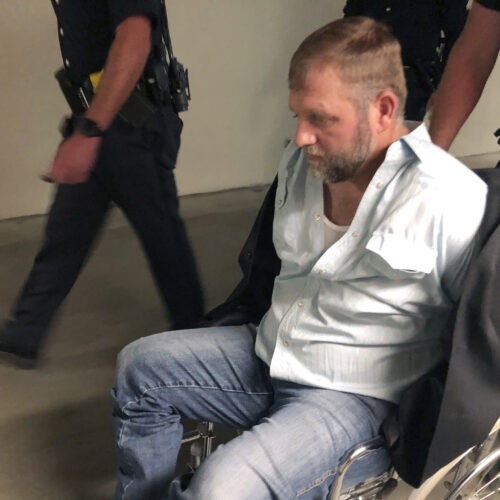
Ammon Bundy, Leader In Anti-Government Movement, Running For Idaho Governor In GOP Primary
Anti-government activist Ammon Bundy is running to be Idaho’s next governor, according to documents filed Friday with the Secretary of State’s office.
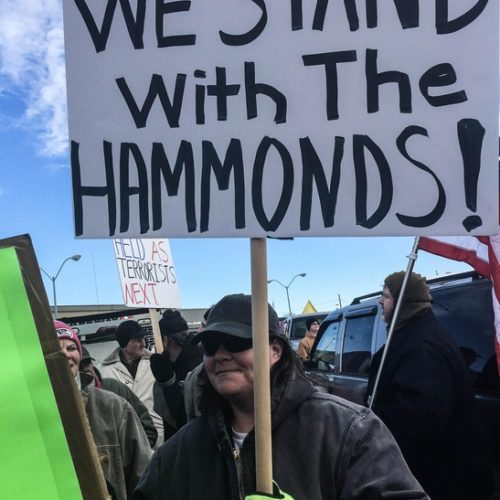
Interior Department Rescinds Grazing Rights For Hammond Family, Reversing Trump Admin’s Decision
It reverses the decision by former President Donald Trump’s Interior secretary, David Bernhardt. He had granted the permit to Dwight and Steven Hammond on Trump’s final day in office. The permit gave the Hammonds the right to graze livestock on public land for 10 years.
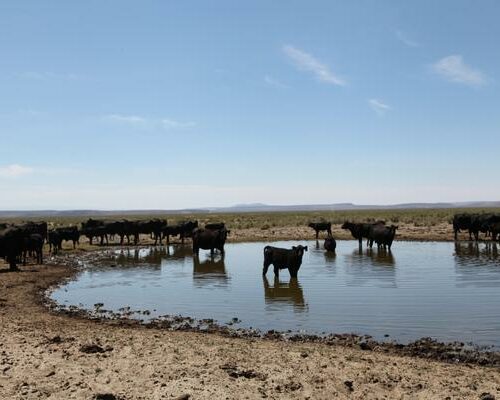
Hammond Family, Previously Pardoned By Trump, Get Back Grazing Rights On Last Day Of Presidency
The U.S. Bureau of Land Management on Tuesday issued a grazing permit and privilege to two eastern Oregon ranchers whose imprisonment sparked the armed takeover of the Malheur National Wildlife Refuge in 2016.

